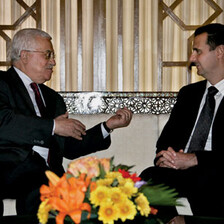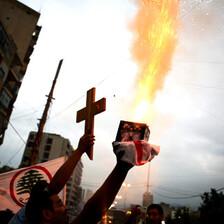Electronic Lebanon 14 January 2008

Lebanese soldiers stand guard outside the Lebanese parliament as parliamentary members meet inside to discuss electing Lebanon’s next president, 7 December 2007. (Matthew Cassel)
Regionally, the lack of a strong uncontested power among the Arab states has meant no one country (Syria on one side and Saudi Arabia and Egypt on the other) is able to either enforce its own solution or completely undermine the demands of the other Arab states. A weakened American president and a relative setback in implementing US aims in the region has also meant that despite an ability to undermine any resolution not in line with US interests, imposing a US agenda in Lebanon has failed so far.
Domestically, the sectarian jockeying for power continues to block any externally imposed settlement that does not cater to the main sectarian parties. The role of Christians and that of Michel Aoun continues to be pivotal. Their alliance with Hizballah has meant that isolating the resistance movement against Israel comes out as also an attempt to undermine the Christians and not simply a fight against “Islamic fundamentalism,” the latter a scenario favored by the US and its allies.
All of this, added to the fact that the most militarily powerful player capable of taking the conflict to a violent stage, Hizballah, continues to exercise self constraint, means that the status quo is likely to continue pending any further regional instability before a new president occupies the White House next year.
So what was the Arab initiative about? The initiative envisions a settlement of the impasse via three main steps to be taken in the following order:
1. The immediate election of a president (and the granting to him a share in the government that can tip decisions one way or another in certain cases).
2. The formation of a coalition government in which no one party has absolute majority or veto power.
3. The revision of the electoral law.
The devil is in the details, and Lebanese politicians are veterans of contesting interpretations of these provisions, something Moussa became painfully aware of on his last trip. But details aside, what does the initiative mean in the big picture?
Ibrahim al-Amine in Al-Akhbar draws certain strategic lessons from the Arab initiative. Suleiman Takkiyyedeen looks into the dynamics of the official Arab regimes relationship with the Lebanese Christians represented by Aoun. Meanwhile, Faris Khashan of the Hariri mouthpiece Al-Mustaqbal lays blame squarely on Syria for the initiative’s failure.
Al-Akhbar, 8 January 2008, Ibrahim al-Amine, “The Cairo settlement bypasses the Constitution and the Taif [Agreement] and its alternative is ruin”:
The outcome of the Cairo meeting suggests the following:First, The return of a balance of Arab roles in Lebanon: Syria on one side, and Saudi Arabia and Egypt on the other, and the rest as mediators adept at moving between these poles.
Second, The participants recognized that the failure of the Lebanese to reach a balance formula for governance means the relegation of a solution to outside forces.
Third, the agreement’s structure and its provisions mean that the various Arab players have bypassed the principles of the Lebanese constitution more than expected. And if Syria had been berated previously for backing the amendment of the constitution to chose a president or extend his term, the Arabs now rely on this precedent and treat the amending of the constitution as a mundane matter, which practically suggests the elimination of any objection standing in the way of this amendment.
Fourth: The Arabs have passed the stage of laying down the general framework of an agreement, and instead have dealt with details, particularly those pertaining to internal balances of power. And when they speak of a solution that grants the President additional power, they are in effect admitting that the special status of the presidency as it is articulated in the Taif Agreement is not valid anymore. They are also indirectly saying that what the Muslims, in particular the Sunnis, refuse to acknowledge in writing, they are acknowledging through facts on the ground through granting the President a share of the ministers that allows him to control the government, and favor one bloc over another. And this extra political weight has been given with foreign and international backing that gives him immunity in the face of internal parties.
Fifth: Looking into the electoral law in this manner means an acknowledgment that what has been used previously is not valid anymore, and so hinged on the level of election laws will be the gateway to formulate a political management of the country in a different way than what is currently the case. And this is a major bypassing of the Parliament, given the latter is the institution that produces electoral laws.
As-Safir, 12 January 2008, Suleiman Takkiyyedeen, “What kind of an Arabized solution?”:
What worries the official Arab regime is the positioning of the [Lebanese] opposition in which a major Christian current occupies a special place in its resistance to recognize the government’s project that is pro-Western (in its American form) and supportive of the official Arab regimes.The Arabs don’t see the Christians as an important player in rebuilding national unity through their effective and distinct energy that adds a special flavor to the liberal and open political thought and life in Lebanon. Instead, the Arabs wish to use the Christians as a tool for a political Arabization of Lebanon that reflects the political weight in the official Arab regime. But most Christians are aware today that this “Arabization” is one of the worst such waves that impacted Lebanon. It pumps into Lebanon regressive politics and carries Lebanon onto the bandwagon of the American project, a project that gives no weight to issues of freedom and cultural diversity but exacerbates all the contradictions of society to entrench its hegemony in that society as is the case in Iraq.
And so the question is, does the Arab Initiative constitute a gradual understanding of Lebanese realities … and therefore lays the ground to further steps that result in solutions even within the scope of resurrection of state institutions? Or does it remain in a trial phase that simply postpones the explosion of the crisis until a more convenient timing?
Al-Mustaqbal, 13 January 2008, Faris Khashan, “The Mission of Moussa is governed by Syrian rules that scuttles the mission of Kouchner”:
The most optimistic theories in Lebanon estimate that the Presidential election will not take place before March, specifically on the eve of the scheduled date for the Arab summit in Damascus. Proponents of these theories believe that the Syrian regime will never allow for an Arab summit to reflect badly on itself through the fast tracking of a widespread boycott led by the Saudi kingdom that had confirmed that it will not go to the Damascus summit if the Lebanese presidential palace does not become occupied by the army chief Michel Suleiman …And there are those who say that the Syrian regime prefers the steering of a large-scale conflict with Arab countries and with the international community than watching Lebanon recover outside the Syrian regime’s direct or indirect patronage, and that is what has happened since the beginning of 2004 …
And so it is clear that Arab League secretary Amr Moussa will face one failure after the other in Lebanon, the same way the French foreign minister Bernard Kouchner did.
Meet the Lebanese Press is EI’s twice-monthly review of what is making the rounds in the Lebanese press and the pundits’ take on it.
Hicham Safieddine is a Lebanese Canadian journalist.
Related Links





